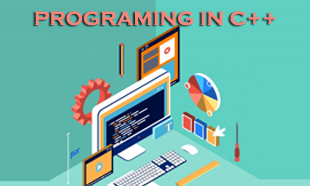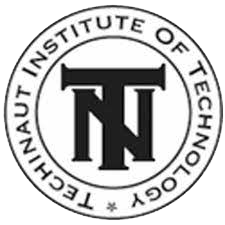0
Unlock the power of coding with Ashish Academy's Programming Course in C++ in Jeypore, Koraput, Odisha. Master object-oriented programming, data structures, and algorithms. Dive into the world of software development and unleash your programming potential.
PROGRAMMING COURSE IN C++
Proficiency in programming languages is essential for building robust and efficient software solutions in software development. Recognizing the significance of equipping individuals with the skills to develop software applications, Ashish Academy, a franchise of Techinaut Institute of Technology situated in Jeypore, Koraput, Odisha, offers a comprehensive six-month course named "Programming Course in C++." This program is meticulously designed to provide participants with in-depth knowledge and practical skills in C++ programming, empowering them to pursue rewarding careers in software development and IT.
THE OBJECTIVE OF THE COURSE:
The primary objective of the Programming Course in C++ is to equip participants with advanced knowledge and practical skills in C++ programming language. The course aims to familiarize participants with the fundamental principles, advanced techniques, and best practices in C++ programming through a structured curriculum and hands-on training. By the end of the course, participants will be proficient in designing, developing, and debugging C++ applications and capable of tackling real-world programming challenges with confidence and competence.
COURSE OVERVIEW:
Curriculum Overview
The Programming Course in C++ covers many topics, encompassing theoretical concepts and practical applications in C++ programming. The curriculum is structured to provide participants with a comprehensive understanding of C++ language features, object-oriented programming concepts, and advanced programming techniques. Below is an overview of the key topics covered in the course:
Section 1: Introduction to C++
This section introduces the C++ programming language, providing participants an overview of its history, features, and applications. Participants learn about the syntax and semantics of C++ language, data types, variables, constants, and basic input/output operations.
Section 2: Object-Oriented Programming Concepts
Participants delve into object-oriented programming (OOP) principles and learn about key concepts such as classes, objects, inheritance, polymorphism, and encapsulation. They understand the benefits of OOP for software development, including code reusability, modularity, and maintainability.
Section 3: The Basics of C++
In this section, participants explore the foundational elements of C++ programming, including control structures, loops, decision-making statements, and functions. They gain practical experience writing and executing C++ programs to solve simple computational problems.
Section 4: Working with Operators and Expressions
Participants learn about C++ operators and expressions, understanding arithmetic, relational, logical, assignment, and bitwise operators. They explore operator precedence and associativity rules and learn to manipulate variables and expressions using C++ operators.
Section 5: Controlling the Program Flow
This section focuses on controlling the execution flow in C++ programs, covering topics such as if statements, switch statements, and loop constructs (for, while, do-while). Participants learn to use control structures effectively to implement conditional logic and iterative algorithms.
Section 6: Using Functions/Procedures
Participants gain proficiency in defining and using functions in C++ programs, understanding function prototypes, parameter passing mechanisms, return types, and function overloading. They learn to modularize code and promote code reusability through function abstraction.
Section 7: Pointers and Arrays
Participants explored the concept of pointers in C++ and understood memory management, pointer arithmetic, and dynamic memory allocation. They learn to manipulate memory addresses and work with single-dimensional arrays, multidimensional arrays, and arrays of pointers.
Section 8: Binding Data and Functions
This section covers the concept of data encapsulation and member access control in C++ classes. Participants learn about access specifiers (public, private, protected), data hiding, and encapsulation, ensuring data integrity and abstraction in object-oriented design.
Section 9: Function and Operator Overloading
Participants gain insights into function and operator overloading in C++, understanding polymorphism principles and compile-time polymorphism. They learn to define overloaded functions and operators to handle different data types and perform specialized operations.
Section 10: Reusing Classes
Participants explore code reuse and modularity techniques in C++ programming, including class inheritance and composition. They learn about derived classes, base classes, inheritance hierarchies, and the principles of object-oriented design (OOD) and object-oriented programming (OOP).
Section 11: Virtual Functions and Polymorphism
This section focuses on dynamic polymorphism in C++ using virtual functions and late binding. Participants learn about virtual functions, pure virtual functions, function overriding, and the principles of runtime polymorphism, enabling flexible and extensible software design.
Section 12: Templates, Exception Handling, etc.
Participants delve into advanced C++ features such as templates, exception handling, and generic programming. They learn to use templates to create generic algorithms and data structures and handle runtime errors and exceptional conditions using C++ exception-handling mechanisms.
Hands-On Training and Projects
Participants engage in hands-on training sessions and practical projects throughout the course to apply their knowledge and skills in real-world scenarios. They work on assignments, case studies, and collaborative projects that simulate the demands of the software development industry, allowing them to demonstrate their proficiency in C++ programming and problem-solving abilities.
CONCLUSION:
In conclusion, the C++ Programming Course offered by Ashish Academy provides participants with advanced knowledge and practical skills in the C++ programming language. Through a comprehensive curriculum covering fundamental principles, advanced techniques, and best practices in C++ programming, participants are equipped to pursue rewarding careers in software development, IT consulting, and related fields. With its focus on hands-on training and real-world projects, the course prepares participants to excel in the dynamic and competitive field of C++ programming.


